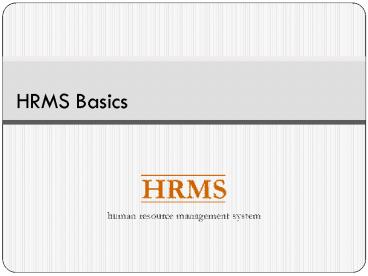HRMS Basics - PowerPoint PPT Presentation
1 / 19
Title:
HRMS Basics
Description:
HRMS Basics Overview What is HRMS? The Human Resource Management System (HRMS) is a web-based application that integrates employment-related procedures such as ... – PowerPoint PPT presentation
Number of Views:343
Avg rating:3.0/5.0
Title: HRMS Basics
1
HRMS Basics
2
Overview
- What is HRMS?
- HRMS Functions and Features
- Concepts and Terms
- Position/Incumbent/Funding Relationship
- Funding
- Documents
- Security and Routing
- Training
- Support
3
What is HRMS?
- The Human Resource Management System (HRMS) is a
web-based application that integrates
employment-related procedures such as
recruitment, hiring, separation, and
compensation. - It identifies positions as unique entities within
the workforce, each with a specific set of
attributes.
4
HRMS Functions and Features
- Manage AP, Classified, Student, Faculty,
Librarians, School Teacher and University
Affiliate positions - Manage funding sources, pay adjustments, and
leave without pay (LWOP) - Define a clear reporting structure
5
HRMS Functions and Features
- Ability to view historical attributes of
positions and incumbents - Update certain position and incumbent attributes
in real time - Allow more access to data through position and
document reporting tools
6
Concepts and Terms
- Position
- A collection of attributes, responsibilities, and
tasks - The position represents the organizational home
of the incumbent/employee - Position ID
- The unique 6-character alpha-numeric ID number
(AA) programmatically generated when a
position is created.
7
Concepts and Terms
- Insufficient Funds
- There is not enough money in the designated
account to cover the position salary and/or
fringe benefit charges. - Default Account
- An account established by a dean/vp office that
is used only when there is missing or partial
funding distribution on a monthly position. The
default account is used to ensure that employees
receive accurate and timely payments and proper
allocation of fringe benefit charges in the event
that there is missing or partial funding on the
position. Default accounts are not used for
hourly positions. - Unfunded
- When there is missing or partial funding, the
funding section identifies use of the default
account by an UNFUNDED indicator on the funding
line. A warning message will also be displayed.
8
Concepts and Terms
- Employee
- Individual with an employment relationship with
The University of Texas at Austin - Incumbent
- Individual currently assigned to a position
9
Concepts and Terms
- What is the difference between incumbent and
employee in HRMS? - Incumbent describes the relationship an
individual has to a position, whereas employee
describes the relationship between an individual
and the university, including information on all
positions the individual has held.
10
Concepts and Terms
- Assignment
- Relationship between an incumbent and a position.
Assignments connect incumbents to the positions
they hold. - Appointment
- Authorization to pay an employee on a particular
account for certain hours, days, basis, and rate.
11
Concepts terms
- What is the difference between appointments and
assignments? - Appointments
- Transaction-based and affect payroll
- Based on account(s)
- Cannot cross fiscal years
- Assignments
- Fuller description of an incumbents relationship
to the position they hold - Can cross fiscal years
12
Position/Incumbent/Funding Relationship
Position
Incumbent
Position ID Owning Unit Job code, Job
title Position title Supervisor Purpose and
functions Qualifications Hours per week Work
schedule Recruiting requirement
Assignment begins
Funding
Account(s) Distribution Begin/End dates
When the assignment begins, the incumbent
inherits the attributes of the position and is
paid from the funding source(s).
13
Position/incumbent/funding relationship
Position
Position ID Owning Unit Job code, Job
title Position title Supervisor Purpose and
functions Qualifications Hours per week Work
schedule Recruiting requirement
Assignment ends
When the incumbent leaves, the position stays on
the org chart (nonfaculty only), is vacant, and
retains its attributes and funding
source(s). The position can then be filled by
another incumbent.
Funding
Account(s) Distribution Begin/End dates
14
Funding
- Funding is associated with the position, not the
incumbent. - Positions can be funded by more than one unit.
The owning unit manages all funding on the
position, but the document routes to each unit
funding the position. - Leave Without Pay (LWOP) is associated with the
incumbent, not the position.
15
Funding
- End date of 8/31 (formerly used for appointments)
is no longer necessary and should not be used
unless the position, funding, or assignment is
actually ending. - Account distribution percentage is not the same
as appointment percent time. - Funding distribution for positions must total
100. If 100 distribution is not provided, then
HRMS will display an UNFUNDED line for the
missing funding percentage. - Pooled positions require 100 funding by a single
account.
16
HRMS Documents
- Most actions in HRMS are driven by the creation
of documents. - Documents are electronic forms used to create or
update positions and assignments. - Each document has a unique document ID.
- Documents route for approval. Routing controls
the approvals required on electronic documents
and is administered by the electronic office
manager or delegates.
17
Security and Routing
- Security
- Authorizations and document routing are set up in
Electronic Office Management (EOM) by electronic
office managers and delegates. - The unit that owns the position must be in an
authorization view for which the creator of the
document is authorized. - Routing
- Routing controls the approvals required on
electronic documents and is administered in EOM
by electronic office managers and delegates.
18
Training
- Where can I find out about training?
- Training resources are available here
http//www.utexas.edu/business/erp/hrms/training.p
hp
19
Support
- Where can I get help?
- Online Help
- http//www.utexas.edu/business/erp/hrms/help/
- HRS Representative
- http//www.utexas.edu/hr/hrpro/lookup/
- Frequently asked questions
- askUS - https//austin-utexas.custhelp.com
- Report an issue with HRMS (UT EID required)
- https//utdirect.utexas.edu/security-443/UTEIDLogo
n.wb































